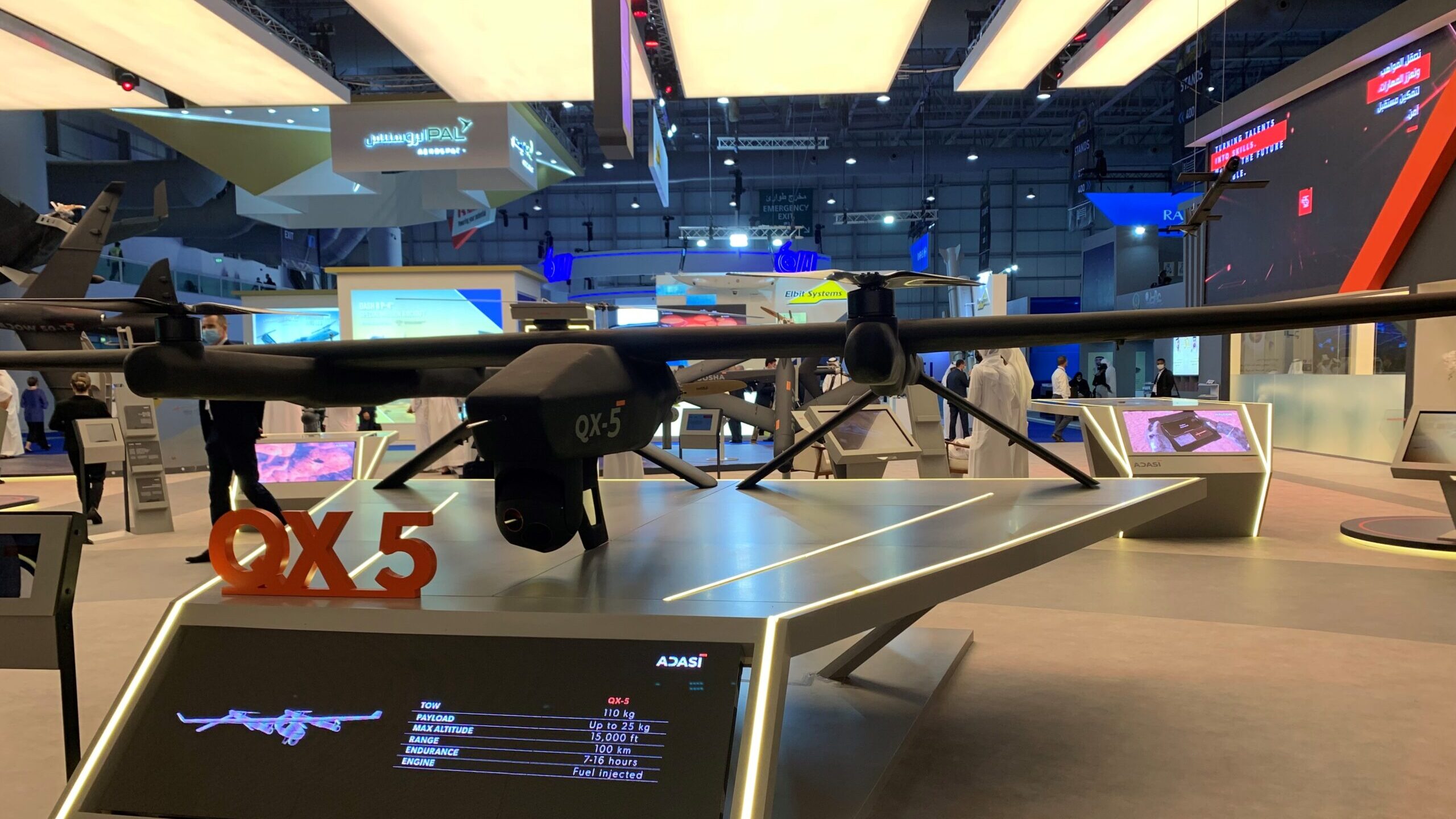
A static display of EDGE’s latest locally made QX-5 drone at the Dubai Air Show (Chyrine Mezher)
DUBAI: The first two days of the Dubai Airshow served as a test case for the UAE’s “Make it in Emirates” initiative, with UAE-based EDGE Group unveiling key locally-produced technologies and announcing new agreements with China and the US.
EDGE, the biggest homegrown defense firm in the Emirates, rolled out a series of homemade systems the company believes can be quickly spun into production.
The first system was the GPS-Protect system, developed by EDGE subsidiary SIGN4L. It represents the first domestically-produced anti-jamming system, designed for integration into unmanned systems, guided weapons vehicles, ships, and aircraft.
“The great thing about this system is the fact that it can be used on all platforms, especially non-reusable ones like guided munitions,” Filip Kostomlatsky, senior program manager at SIGN4L, told Breaking Defense.
The company plans to deliver the first unit to the UAE MOD by the end of this year. “We already tested the device on GPS-guided precision munitions and drones,” said Kostomlatsky. “We are now going to move into bigger platforms such as aircraft, an easier task given that we have more space to work on.” He added that the company plans to “deploy tens of thousands in the next three years.”
The system uses a multi-element controlled reception pattern array antenna and provides resistance against one or multiple jamming signals. It also implements multiple mitigation methods and specialized digital signal processing algorithms to ensure continuous operation of systems that rely on satellite navigation when GPS jammers or other mechanisms are used to jam or disrupt satellite signals.
Shifting to unmanned capabilities, the company launched two vertical take-off and landing (VTOL) drones, the QX-5 and QX-6, and the high-precision guided munition system Rash 2H.
“The unveiling of new additions to the QX and Rash families, with the first prototypes of these ranges launched only nine months ago, highlights our commitment to bringing new advanced products and technologies to market with speed,” said Faisal Al Bannai, CEO of EDGE Group.
RELATED: Exclusive: General Atomics is secretly flying a new, heavily armed drone
The QX-5 is designed for an extended endurance of 16 hours, with a 25 kg payload capacity. QX-6 has an extended payload of 150 kg and, depending on payload configuration, it has an endurance of up to four hours. Both systems feature autopilot and communication systems to perform missions autonomously.
And EDGE subsidiary Halcon unveiled the Hunter 5 and Hunter 10 tube launched drones suitable for recon and attack missions, operating at cruising speeds of 40 and 60 knots respectively. A final UAV unveiled at the Dubai Airshow was the Reach-S, a fixed wing drone possessing a take-off weight of 400kg and a payload of up to 120kg.
Halcon CEO Saeed Al Mansoori said that company places a strong emphasis on innovation and future-proofing its product range. “These UAVs represent the continuing commitment to provide clients with the most advanced platforms that support their evolving mission critical needs, and we are proud to have the ability to do so from our base right here in the UAE,” he said.
Halcon also announced a series of milestones for its SkyKnight air defense missile system, including the completion of the system’s naval missile concept design. A SkyKnight naval launcher design and prototype was on display at the show.
Back at IDEX 2021, the United Arab Emirates announced it will supply its first indigenous rocket, artillery and mortar (C-RAM) missile system to Rheinmetall’s Oerlikon Skynex air defense system.
“The program is on track to be developed over the next 4 to 5 years,” Wim Strydom, COO of Halcon told Breaking Defense. “We plan to introduce the SkyKnight to the bigger Skynex system over the next 10 years.”
Although the company’s main initiative is to support domestic air force and air defense units, it is looking to “build a relationship with the UAE Navy to see how they want to apply the SkyKnight in their environment,” said Strydom.
Halcon also won a US$880 million contract from the UAE Armed Forces for its Thunder and Desert Sting range of precision guided munitions, a “significant move on a global scale for this type of weapons system,” said Saeed Al Mansoori, CEO of Halcon.
“It is with a great sense of responsibility for having been entrusted with this undertaking that we move ahead in confidence that the performance of our systems will fully justify the UAE Armed Forces trust in us,” he said.
LAHAB, a sister EDGE company, will be charged with filling the Desert Sting warhead manufactured in Halcon’s production facilities in Abu Dhabi.
China Enters The Arena
As notable as the technology was, perhaps the biggest day one announcement from EDGE came from its subsidiary GAL, which announced the opening of the first regional distribution hub for aircraft logistics in Abu Dhabi with Chinese state-backed defense contractor, China National Aero-Technology Import & Export Corporation (CATIC).
Any agreement between the UAE, a longtime close partner of the US< and the UAE is going to raise eyebrows, given the competition between the two super powers. More specifically, it comes at a time when UAE officials say the US is pressuring them to sever ties with Chinese tech firm Huawei or risk losing the F-35.
When asked about the types of aircraft that will be serviced here, the company declined to comment. “We are looking forward to servicing the customers in the region and assisting a faster delivery time to regional aircraft needs,” a spokesperson told me.
The new Middle East & Africa Distribution Center will improve the availability of aircraft spare parts in the UAE and MENA region. “We understand the challenges posed by spare parts distribution in the region,” Khalid Al Breiki, president of mission support and MD at GAL, told Breaking Defense.
“The warehouse will significantly improve access to these essential elements, as well as increase productivity and reduce complicated logistics which arise when coordinating with international vendors,” he added.
It will also increase speed and simplify the distribution of components for aircraft built by the OEM.
The 1,440-square-meter facility, located in ADAFZ near Abu Dhabi International Airport, is expected to reduce the aircraft spares delivery period from weeks to fewer than 48 hours.
“By extension having spares positioned in the Middle East, repair times on aircraft can often be reduced from months to weeks,” added Al Breiki. “Customers not only save costs by avoiding maintaining their own expensive inventories of spare parts but will also save time by avoiding extensive delays when sourcing spares from an OEM’s country of origin.”
GAL is also working on further capitalizing on all the depot level capability that AMMROC, an EDGE entity, has developed in Al Ain over the past few years. “We are very excited about our efforts in working together with AMMROC to support the development of additional capabilities, but at the same time maximizing our usage of their existing advanced MRO capabilities,” he said.
GAL has also been awarded a three-year AED11 billion Performance-Based Logistics contract to supply the UAE Air Force and Air Defense with maintenance, repair and overhaul, and support services.
Speaking to Noora Mohammad Belselah, project manager at GAL, she said the deal will put the company on the international map. “It allows us to provide services to customers outside the GCC region. I see GAL growing first in the African region.”
The PBL arrangement allows military customers to seek aviation MRO services organized under a cost per flight hour model and facilitates ongoing improvements.
Back to basics
EDGE also announced new agreements with two major American firms, Lockheed Martin and Raytheon.
EDGE announced an agreement its Earth subsidiary and Lockheed covering repair and sustainment services for the Modernized Targeting and Designator Sensor (M-TADS) systems. Under the agreement, the two entities will explore ways to localize critical aspects of sustainment of AH-64 Apache helicopters flown by the UAE’s Joint Aviation Command.
The move, said Omar Al Zaabi, senior vice president head of program acquisition at EDGE, is “another example of the ways both companies are using their capabilities and taking advantage of cutting-edge technologies to provide next-level repair and maintenance support for the M-TADS systems of UAE Armed Forces Apache fleet.”
The group also signed a MoU with Raytheon Emirates to expand collaboration for in-country development of hardware and technology supporting Raytheon’s Early Warning Radar System (EWRS). “This partnership establishes the groundwork for additional workshare agreements on EWR and several major defense programs,” a Raytheon Emirates spokesperson told Breaking Defense.
The agreement will enable the companies to deliver an EWRS, including localizing sustainment, training, manufacturing, and research and development.






















